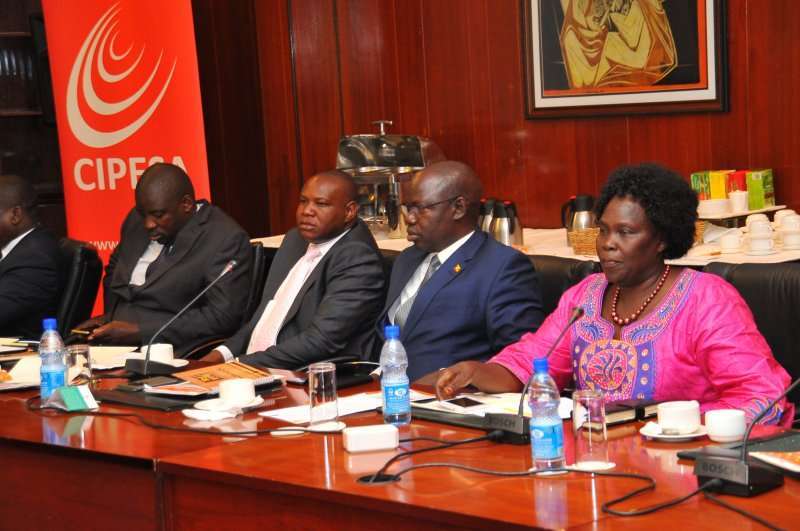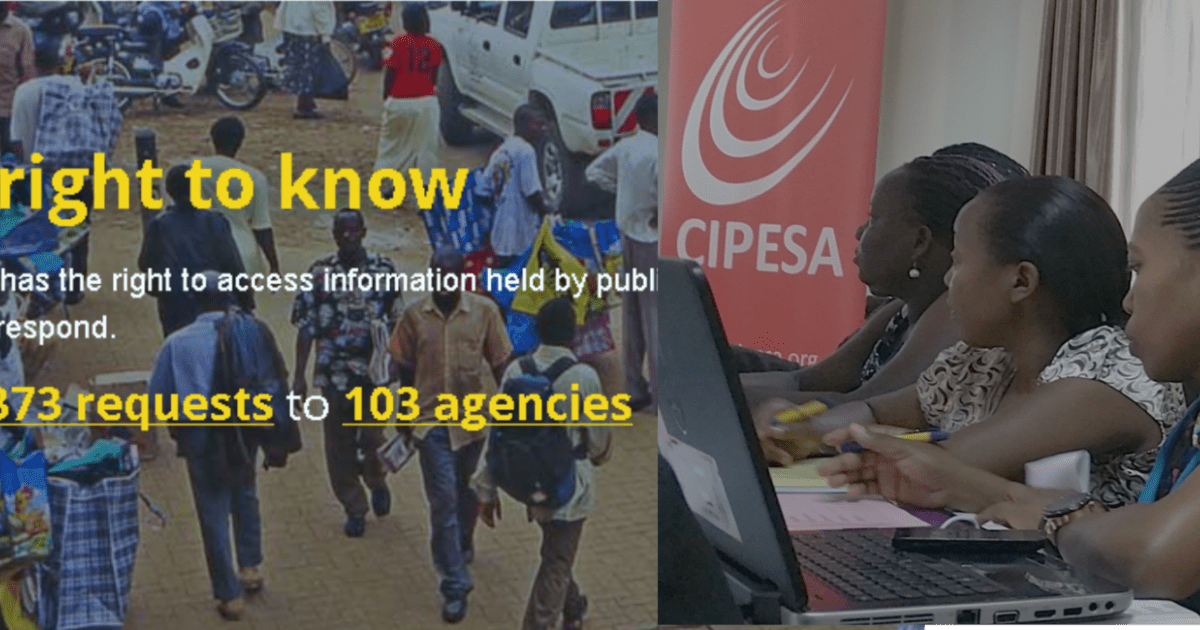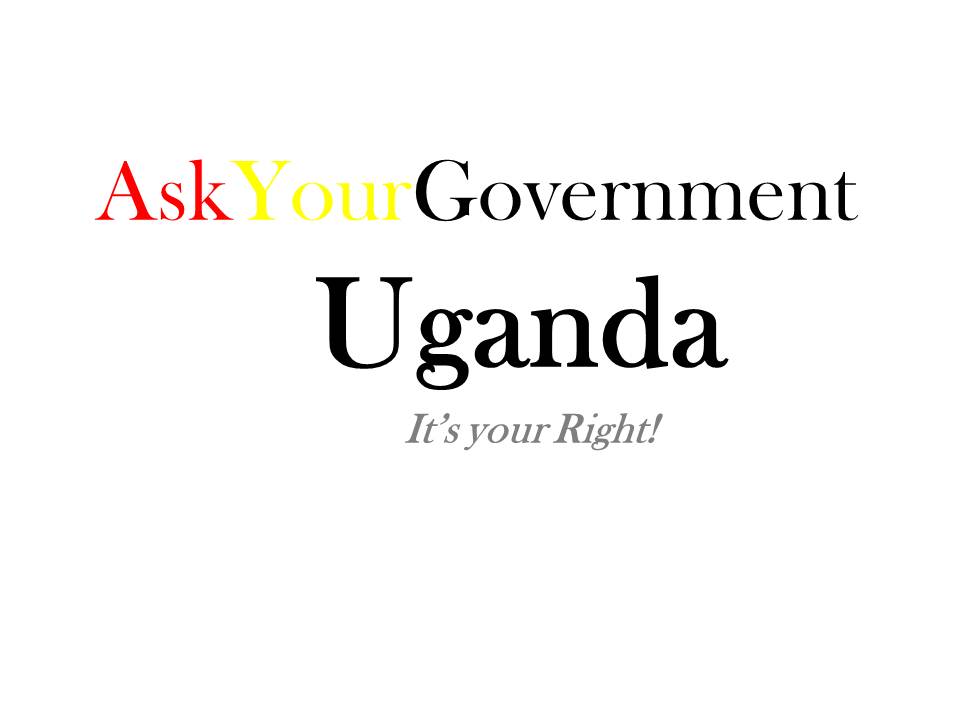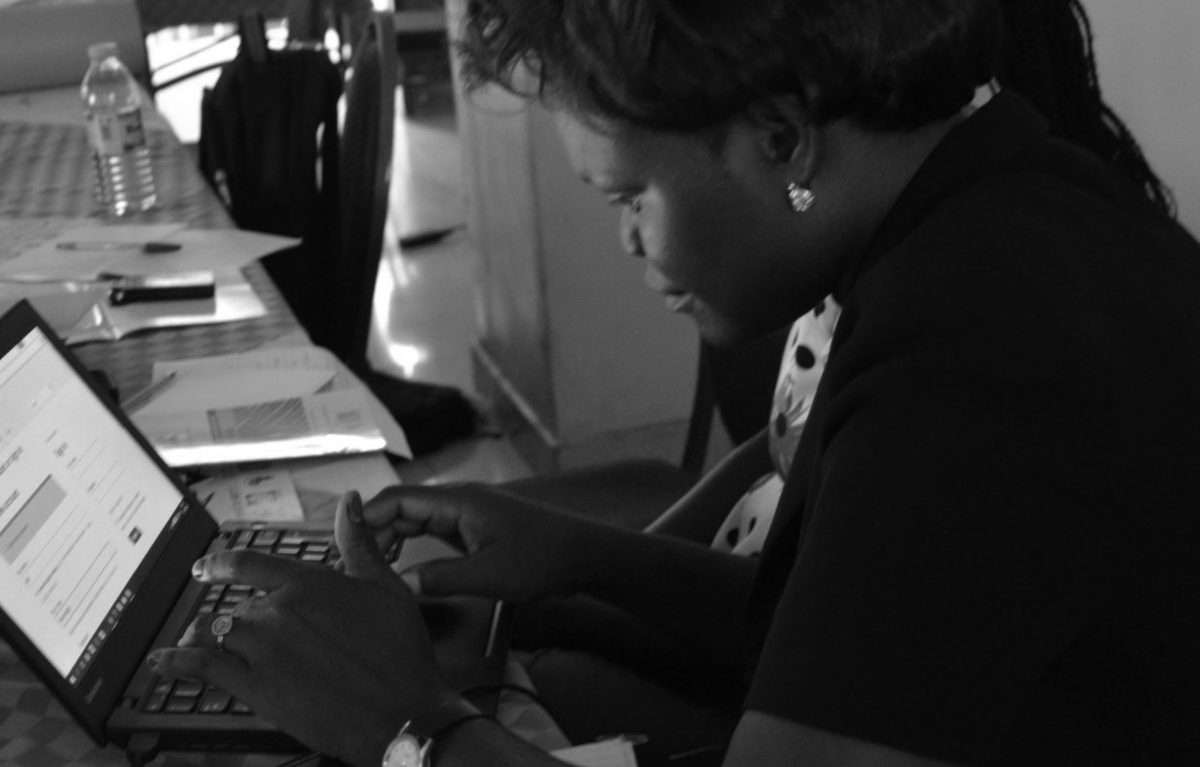By Loyce Kyogabirwe |
Despite the existence of legal and regulatory frameworks that promote the right to information, access to public information remains a big challenge in Uganda. The potential of ICT to promote citizens’ access to information is widely acknowledged and in 2014, the government and civil society partners launched the Ask Your Government (AYG) web platform that allows citizens to make online information requests to government Ministries, Departments and Agencies (MDAs).
However, four years on, it is evident that most citizens might not be aware of their right to information let alone the procedures for accessing information and data that is held by public bodies. Meanwhile, public officials continue to ignore citizens’ information requests despite efforts to equip both the duty bearers and rights holders, including information officers, journalists as well as women’s rights organisations, with knowledge and skills on rights and responsibilities.
User statistics from the AYG portal show an increase in the number of requests as well as number of public agencies registered on the portal. Between 2014 and 2016, only 243 requests were submitted to 76 agencies. But by June 2018, the number of information requests submitted had reached 2,450, to 106 MDAs (20 Ministries, 60 Departments and Agencies and 26 to Local Government Officials).

The highest number of information requests have been submitted to the Uganda Revenue Authority (URA) – 350 between June 2014 and June 2018, followed by the Ministry of Defence with 152.
However, the nature of requests lodged still indicates a misinterpretation of what falls under a public information request as most of the submissions are related to internships and Tax Identification Numbers (TIN). Perhaps this is an indication of the priority information needs of many of the portal’s users.
Also of concern is the low response rate to information requests. Of the 2,450 requests submitted between June 2014 and June 2018, only 121 have been indicated as successful and and 102 as partially successful, representing an average response rate of 9%. Less than 1% of requests (20) were rejected while those still awaiting responses are 2,074 or 85%. The 85% can be regarded as refusals under section 18 of the Access to Information Act (ATIA), 2005 which states: “an information officer fails to give the decision on a request for access to the person concerned within the period contemplated under section 16, the information officer is, for the purposes of this Act, regarded as having refused the request.” The response period is 21 days.
In some cases where public information was requested, users were advised to visit the respective MDAs in order to access such information. For example Davidson Ndyabahika, a journalist working with Uganda Radio Network, requested for statistics of enrolment and performance of both private and public primary and secondary schools in Ntungamo District from 2010 to 2016 from the Ministry of Education and Sports. He was advised to physically visit the Ministry offices where he would be cleared first before accessing such information. Such a response indicates challenges with digitised information storage and retrieval among public agencies although section 10 of the Act mandates information officers to ensure that records of a public body are accessible.
Equally, there are cases where limitations of the portal have emerged and information has been withheld because it can only be provided after payment of the statutory search fees. The ATIA specifies a non-refundable access fee of Uganda Shillings (UGX) 20,000 (USD 5) which remains a high cost for the majority of the population.
The limited levels of government responsiveness to information requests and uptake of AYG by both citizens and public officials impact upon initiatives working to promote access to public information for social accountability and civic engagement. This calls for more capacity enhancement, sensitisation and awareness raising among public officials of their duties and responsibilities as laid down in the Access to Information Act. Likewise, MDAs ought to utilise the different ICT platforms and tools to proactively release public information as prescribed in the Act and make efforts to ensure that citizens are aware of such information and where to find it.
Under Section 7 of the Act, public bodies are mandated to compile manuals containing descriptions, addresses, the nature of work, services and how to access information within six months after the commencement of the Act. However, 13 years since the law was passed, only the Ministry of Lands and Urban Development has adhered to this requirement. Indeed the ministry was in 2015 awarded the most responsive public entity as part of commemoration of International Day for Universal Access to Information (IDUAI).
Likewise, section 43 of the Act requires every minister to submit an annual report to Parliament on requests for records or access to information made to a public body under his or her ministry indicating acceptance or rejection, and reasons for rejection. However, there has never been any report from ministers since 2005 when the Law was passed, and Parliament has never demanded for such reports.
Meanwhile there should be efforts to continuously empower citizens to fully exercise their right of access to information as stated in Article 41 of the Constitution and Section 5 of the ATIA. Such efforts include capacity building of different demographic groups such as women, youth, persons with disabilities (PWDs), journalists, and teachers to demand for public information relating to service delivery and accountability while utilising different ICT platforms and tools including the AYG portal. Public officials should also be empowered to utilise these tools to proactively share public information with citizens.
The AYG is an initiative of the Ministry ICT and National Guidance in partnership with the Africa Freedom of Information Centre (AFIC) and the Collaboration on International ICT Policy for East and Southern Africa (CIPESA).
CIPESA Engages Ugandan Members of Parliament on Implementation of Access to Information Law
By Loyce Kyogabirwe |
It is 12 years since Uganda passed an access to information law with the purpose of promoting transparency and accountability in all organs of the state by providing the public with timely, accessible and accurate information. The law also empowers the public to scrutinise and to participate in government decisions. However, the law has remained largely unimplemented as many Ministries, Departments and Agencies (MDAs) ignore citizens’ requests for information and rarely release information pro-actively, which contravenes the law.
“I have sent several information requests to the Ask Your Government (AYG) Uganda portal. It is now three months and I have never received any feedback,” said Cuthbert Abigaba, Member of Parliament (MP) for Kibaale county in Kamwenge district, while speaking at an engagement of Uganda’s MPs on implementing the Access to Information Act 2005. Organised by the Collaboration on International ICT Policy for East and Southern Africa (CIPESA) on July 13, 2017, the convening was a follow up on an earlier engagement with the MPs on their duties and responsibilities in enforcing the access to information law.
Section 43 of the Access to Information Act requires parliament to receive annual reports from each minister detailing all requests received from citizens for access to records or information, and indicating whether access was granted or not, and where access was not given, the reasons for the denial.
However, Parliament has never received any such reports, nor has it asked ministries to comply with this provision of the law. This issue was also raised earlier in April 2017 when CIPESA presented a position paper on the State of Access to Information in Uganda to MPs on the ICT Committee. The paper highlights some government initiatives to promote access to information, identifies gaps in the law, and makes recommendations for amendments to the law in order to enhance citizens’ access to information.
At the this month’s meeting, CIPESA presented to 16 MPs a comparative analysis of access to information legislation in East Africa and urged the lawmakers to pursue the proposed amendments so as to align Uganda’s law with progressive provisions in some of the East African Community (EAC) Member States’ laws, as well as to international human rights instruments.
“While it is recognised that the EAC region is progressing in promoting the right to information, there are a number of issues that have bottlenecked citizens’ right to information. These include: lack of access to information by non-citizens in Uganda, Kenya and South Sudan; lack of ATI regulations in Rwanda, Kenya, Tanzania and South Sudan; lack of a clear definition of security information by Uganda; lack of provision for transferability of requests in South Sudan; limited scope of bodies the law applies to in Uganda; prohibitive access fees in Uganda, as well as the lack of clear complaints mechanisms in Uganda.” Comparative Analysis of Access to Information Legislation in Africa, June 2017.
During the meeting, the MPs expressed concern over insufficient knowledge among legislators about their duties and responsibilities under the law. They also noted that citizens were not sufficiently aware of their rights and the obligations of public officials. The legislators called for wider awareness raising to increase citizens’ demand for information. “If a Member of Parliament like me did not know the access to information law, what about the citizens who are not even educated?” said Rose Mutonyi, MP for Bubulo West, Manafwa district.
On the other hand, the MPs appreciated the recommendations and proposed amendments contained in the two position papers and suggested an action plan for meaningfully implementing the access to information law. Among the strategies put forward was to engage the Office of the Speaker of Parliament, sensitise more MPs to demand for annual reports from ministers, and engage ministers to submit the annual reports.
Nonetheless, the MPs cited the need for more capacity building on access to information for the majority of legislators to inform their discussions in parliament. As noted by Majegere Kyewalabye, MP for Bunya East, Mayuge district, “We need to be prepared more before we can go on the floor of parliament to present these issues.”
The engagement with MPs was organised by CIPESA in partnership with the Greater Parliamentary North Forum in the context of the ICT4Democracy in East Africa initiative’s objective to engage stakeholders on supportive policies and practices for human rights and democratic governance in East Africa.
Fostering the Right to Information Among Women’s Rights Organisations in Uganda
By Juliet Nanfuka |
Goal 5 of the Sustainable Development Goals is to ensure women’s full and effective participation and equal opportunities for leadership at all levels of decision making in political, economic and public life. Access to information is necessary in advancing gender equality and women’s participation in governance processes.
Accordingly, the Collaboration on International ICT Policy for East and Southern Africa (CIPESA) is undertaking a series of engagements to create awareness of the right to information law in Uganda and the avenues through which women’s rights organisations can exercise this right to empower women in the country.
At a training on November 11, 2016, 12 representatives from women’s organisations discussed the relationship between women’s rights and the right to information with a focus on how to utilise Information and Communication Technology (ICT) to bridge the two rights. Specifically, SDG 5b calls for enhancing the use of technology, in particular ICT, to promote the empowerment of women.
Ashnah Kalemera, CIPESA’s Programmes Officer, noted that, “For the realisation of women’s rights and indeed many other rights in Uganda, the role that access to information plays should be better understood and should not be seen as exclusive of other rights such as non-discrimination, privacy and right to health.” She added that, “it is every citizen’s right to have access to information held by the state. However, this is challenged by the lack of awareness to demand information which would enable a more transparent and accountable state and ultimately citizens who can make informed decision on issues that affect them.”
“Every citizen has a right of access to information in the possession of the State or any other organ or agency of the State except where the release of the information is likely to prejudice the security or sovereignty of the State or interfere with the right to the privacy of any other person.” Article 41 of the Uganda Constitution
Training participants noted that the unavailability of information hampers civil society organisations’ engagement on pertinent social issues, as they often cannot develop in-depth reports or make interventions to empower women on the basis of strong evidence.
The use of ICT as an enabler of access to information has long been recognised by Uganda citizens and officials alike, however, platforms such as the online information request portal Ask Your Gov are providing an avenue for ordinary citizens and organisations with limited access or technical skills to request information . The portal allows for information requests submitted and responses given to be seen by anyone who accesses the website.
At the training, participants assessed information requests on the portal and their relevance to women’s rights and submitted information requests of their own. Loyce Mugisa from the National Association of Women Organisations in Uganda (NAWOU) said a highlight from the training was discovering “the amount of information available that we did not know about.” She added that she placed an information request on the portal and within a few minutes received a response from the land ministry. According to the law, public officials have 21 days within which to respond to an information request, which has often been cited “too long” to wait. “Encouraged” by the prompt response to her query, Mugisa has since sent a follow up question. See the interaction here.
Long held skepticism about the voluntary release of public information by the state has contributed to the poor use of the law. This is also due to conflicts with existing laws such as the Official Secrets Act.
Nonetheless, participants at the training reported an enthusiasm about the applicability of the law in their organisations to serve women’s interests.
*Organisations represented at the training included Alliance for Women in Development, Eastern African Sub-Regional Support Initiative for the Advancement of Women (EASSI), Isis-Women’s International Cross-Cultural Exchange (Isis-WICCE), National Union of Women with Disabilities (NUWD), National Association of Women Organisations in Uganda, Uganda Association of Women Lawyers (FIDA), Uganda Media Women’s Association (UMWA), Women’s Democracy Network (WDN Uganda), Women And Girl Child Development Association (WEGCDA), Women of Uganda Network (WOUGNET), and Young Women’s Christian Association (YWCA-Uganda),
CIPESA’s engagements on women’s rights and access to information are supported by the Association for Progressive Communications (APC).
Project Evaluation: Open Data and Right to Information
Tweet
Report |
During 2014 and 2015, CIPESA implemented a project aimed at empowering citizens in East Africa to use Right to Information (RTI) laws to lodge requests and document their experiences through the use of Information and Communication Technologies (ICTs). The project further aimed to undertake awareness raising and network building activities to promote the right to information in Kenya, Uganda and Tanzania, and create awareness among lawmakers on regressive policies and practices that undermine proactive disclosures. The project also planned on network building to be achieved through the sharing of experiences gained from the three countries among the engaged network of change actors across the region.
Since the closure of project activities, an evaluation was commission to establish the achievements, outcomes and challenges registered by the project during the period January 2014 – December 2015. The evaluation assessed the appropriateness, effectiveness and outcomes of the project in relation to its planned objectives.
The evaluation focused on project activities in Uganda and the use of Alaveteli – an Open source platform that enables citizens to request for information with the replies recorded for all to see on the AskYourGov (AYG) website (www.askyourgov.ug) as the key technology medium, as well as social media namely Facebook and Twitter.
Key findings
The use of the AYG platform by citizens is still low, compared to alternative Freedom of Information (FOI) channels (for example, a respondent at the Ministry of Lands Housing and Urban Development reported that he receives/responds to approximately 32 requests a day by phone, face to face, or paper-based request forms), and has not grown over the two years. As well, the response from MDAs is below average. Though there is political will from the Office of the Prime Minister in Uganda, ownership of the platform and its continued functionality is still the responsibility of partners – Africa Freedom of Information Centre (AFIC) and CIPESA and does not seem to have yet taken root within most Ministries, Departments and Agencies (MDA).
Recommendations
- Consider a phased approach to implementing the AYG platform in MDAs. Adopting a more systematic phased approach to implementation and roll out, and contextualized to the specific needs of each agency could help address the unique MDA contexts and ensure a more effective use of the platform. Rather than spreading efforts (of particularly limited resources) and adopt a blanket approach to the implementation of the portal, a phased systematic approach that involves a few MDAs coming on board at a time is recommended. For example the evaluation shows that the majority of the FOI requests are related to land, taxes and inquiries on internship and recruitment. This could be interpreted in two ways: – (i) that these issues could be the most pressing information needs of citizens currently; or (ii) that the effective response from the respective MDAs has created citizen demand. This could give some insight to justify a phased approach in prioritizing MDAs to work with on the AYG platform.
- Build an Advocacy network of CSOs to sustain the demand for government responsiveness on the AYG platform. Such a network is likely to realize a much stronger and sustained voice in mobilizing, advocating and lobbying continuous Government’s responsiveness on the AYG platform.
- Sustain stakeholders’ engagement activities (awareness raising and capacity building). Some of the issues that hinder requesting and disseminating information by the rights holders (citizens) and duty bearers (government officials) respectively are the culture of secrecy among duty bearers, and the limited understanding of the RTI laws among other things. Changing such individual and organization norms, cultures and practices takes time. Sustained engagement of rights holders and duty bearers is therefore very critical and future projects should avail sufficient resources for this.
- Make the platform more inclusive to encourage usability in different contexts. Future implementations could adopt a more inclusive approach that looks into mixing ICT platforms such as the web-based platform, SMS, as well as integrate a back-end function that can easily be manipulated to enable agencies to coordinate and centrally manage information requests from the various modes of delivery i.e. the back-end function should be in position to manage, monitor and keep track of all requests that come into the agencies irrespective of the mode of delivery. This should encourage usability by all classes of stakeholders, while the back-end would provide for easy management and tracking of requests.
Lessons Learned
- The Success of the AYG platform in an MDA is dependent on a number of pre-requisites that include functional business processes, policies, infrastructure, and human resources related to information disclosure. This kind of organization context makes it easy for speeding up the uptake of the AYG platform as it complements already ongoing work and may not appear as an additional burden to MDA officials.
- The AYG platform could be more effective if its roll out is prioritized to target specific information needs of citizens. This prioritization could be based on a number of factors that may include: – findings of a needs assessment of Citizen Information needs, readiness of MDAs, National priorities defined in strategies like National Development Plans among others
- The passing of relevant RTI laws in the country is key in providing an enabling environment to implement a project of this nature
Download and read the full evaluation report here.
Uganda District Officials Trained on Access to Information Tool
By Moses Odokonyero |
Local government officials from the northern Uganda districts of Gulu, Amuru and Nwoya were recently trained in the use of the online freedom of information portal Ask Your Government (AYG). The officials have said the platform, which is accessed at www.askyourgov.ug, will be useful in improving the flow and exchange of information between their districts and the public. The training organised by the Collaboration on International ICT Policy for East and Southern Africa (CIPESA) in partnership with Northern Uganda Media Club (NUMEC) and was held August 31 in Gulu, Uganda. Participants at the training included Information Officers, Community Development Officers, Natural Resources Officers and an Assistant Chief Administrative Officer from the administrations of the three districts in the Acholi sub region.
The training aimed to promote the release of public information held by the state through the use of online tools but with a specific focus on the AYG portal. The portal was launched in 2014 by the Uganda Office of the Prime Minister in partnership with the Africa Freedom Information Centre (AFIC) and CIPESA and is aimed at supporting the Access to Information Act (2005) by enabling citizens to request and receive public information from government authorities.
“I was unaware of the website before the training. But I now know how to use it. I think it will be useful in the sharing of information between us in the local governments and the public,” said Anthony Onen, the Amuru District Population Officer. He added, “But we need more of our colleagues in other departments also trained on how to use the website … because these departments hold information that is important for the public.’’
Meanwhile, Santa Odwa, an Assistant Chief Administrative Officer (CAO) with the Gulu district local government, remarked: “The training on how to use this website will help improve sharing of information with the public but the public must also be sensitised on how to use it and what kind of information can be asked for and not asked for from us.”
The district officials were also taken through different laws in Uganda that govern citizens right to access information, particularly the Access to Information Act, 2005. The Act aims, among others, to promote transparency and accountability in organs of the state by providing the public with information, and to empower the public to scrutinise and participate in government decisions that affect them.
In the context of northern Uganda, transparency and accountability by public authorities and the involvement of the public in the scrutiny of the public organs is particularly important. In the last decade, the region has seen several post-conflict recovery projects funded by both the government of Uganda and donors aimed at rehabilitating the region following years of conflict. Most of these projects have been implemented under the framework of the Peace, Recovery, and Development Programme (PRDP).
Due to a lack of public scrutiny and limited information available to the public about projects under the PRDP, substandard work and corruption impeded delivery of public services under PRDP. In 2012, the Auditor General uncovered the swindling of over 50 billion shillings (US$14.7 million) by officials, which may have been exacerbated by a lack of transparency in the operations of the programme.
In September, 2016, the government launched a UGX 233 billion (US$68.5 million) —Project Restoration of Livelihoods in Northern Uganda (PRELNOR). The seven-year project aims to improve livelihoods and construct community roads to link local communities in nine districts in the Acholi region to markets. This type of project underscores the continued need for the public to have access to information to empower them so they are in position to hold public organs and officials accountable.
According to the communications regulator, as of March 2016, there were approximately 21 million mobile phone subscriptions while 38.9% of Ugandans had access to the internet. These figures pose a great opportunity for citizens to find innovative ways to shape democratic governance, including to monitor government transparency. The AYG portal and other online platforms are increasingly gaining influence and becoming important channels to disseminate information, promote accountability and cause public debate around public service delivery issues in Uganda.
The training is part of activities by CIPESA, NUMEC and local partner radio stations to promote the right to information as a catalyst for service delivery monitoring in northern Uganda and in supported by the Indigo Trust.





